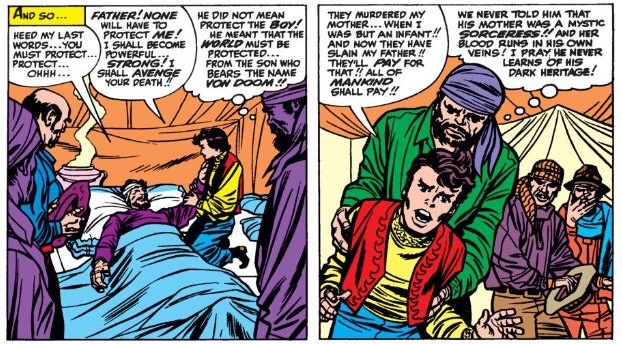People’s History of the Marvel Universe, Wandavision Special: the Difficult Question of Jewish and Romani Representation

The following is originally a Tumblr post from a couple years back (as you can see from some of the contemporary references) that I held back from publishing because I wanted to have a Roma sensitivity reader take a look at it first, and then never got around to finishing when other things came up despite their very kind assistance. However, the popularity of WandaVision brought back some pre-existing discourse around Elizabeth Olsen’s casting as a non-Romani actress and Joss Whedon and pre-Feige Marvel executives’ decision to reimagine Wanda and Pietro Maximoff as radicalized Sokovian nationalists rather than Romani.
This reminded me of the unfinished post I’d written about the difficult question of Romani representation in comics rooted in problematic decisions made during Marvel’s Silver Age and its particular relationship to subtextual Judaism in the work of assimilated Jewish creators. So after the break, I’ve posted an edited and elaborated version of my original post.
One comics related question, Victor von Doom is Roma, a poor Roma in his origin at that, but he has “Von” in his title? Is it that Lee-Kirby never consulted the Almanach de Gotha, a reference to Erich von Stroheim (who was after all a Jewish haberdasher who passed himself as a aristo in hollywood and popularized the “von” concept)? But more importantly how does Doom being a proud Roma with a fake Junker aristo name work as a concept? Is Doom appropriating the Nazi-aristocratic culture?
Ok…this is a tricky topic, because I really don’t want to undercut any of the people pushing for better Roma representation in comics, especially with everything going on with Secret Empire and Peter Alan David’s rant at NYCC. However, Silver Age (and later) comics creators hadn’t usually done much cultural research with regard to the Romani, and tended to base their portrayals in the kind of tropes set out by Bram Stoker’s Dracula and Universal Pictures’ Wolfman films. These tropes tended to traffic in both Romantic exoticism and anti-Romani stereotypes, and (as I’ll explain when I get into some examples) were used by Marvel creators in a way that arguably involved ethnic erasure, which raises questions about how we think about these characters as positive or negative representation.
To answer the original Tumblr ask, with Victor Von Doom, honestly I think the process didn’t go much further than: repeated Vs sound good and while Doom makes no sense as a last name that would exist in reality, there’s the repeated D’s of Doctor Doom, and “von” sounds Junkerish and (thanks to American propaganda from WWI and WWII) we all know the Junkers are bad guys – without any real reference to the sociocultural meanings of European naming conventions and ethnicities.[1] Then Stan Lee and Jack Kirby probably moved on from a name to the character concept of Victor Von Doom as a tyrant (in the original Greek sense of the term) who overthrew the traditional order; why would Victor hate the old order, well he was persecuted, what’s a group that’s persecuted, Romani are persecuted, so go with that. In Von Doom’s case, things get even more problematic, because von Doom’s Romani heritage was used as a way to explain why Doctor Doom has mastery over magi as well as super-science:
Where I think things become even more complicated is when we get to characters like Magneto, Scarlet Witch, and Quicksilver. Because whereas Romani identity probably wasn’t a major element of the character creation process for Von Doom, here I feel like Romani was used as a background as a way to bring up Nazi racial ideology and the Holocaust without explicitly labeling anyone as Jewish. Despite the fact that Magneto, Scarlet Witch, and Quicksilver’s creators Jack Kirby and Stan Lee were Jewish and had (Jack more so than Stan) progressive anti-Nazi politics, there was still something of a tendency in pop culture of that era to keep Jewishness subtextual to which the original generation of comics creators was no exception – something that is explored in excellent detail in Abraham Riesman’s True Believer.
Thus, it wasn’t until the Bronze Age of comics where a younger generation of Jewish creators like Chris Claremont took over the franchise that Magneto was revealed to be Jewish. As a result, some awkward retconning took place, such that Erik Lensherr (or Magnus or Max Eisenhardt) now had escaped Auschwitz and joined a Romani caravan, where he met Magda and then fathered Wanda and Pietro and then left. Now, that’s not to say that there aren’t Romani of Jewish faith or people of mixed Jewish/Romani ethnicity, but given that what little use of Romani cultural identifiers there is in these cases – which generally boils down to the stereotypical caravans of painted wagons, men wearing vests, and an ill-defined state of persecution – makes no reference to the Zhutane Roma, I don’t think that’s what Lee and Kirby were going for.
Rather, I think creators reached for Romani backgrounds because these creators thought that Roma shared tropes associated with European Jews – Eastern European origins, oppressed minority status, an “otherized” cultural difference from the perceived mainstream – so that they could stand in for Jewish, without running into the problems with either management or the consuming public that Jewishness was believed to run afoul of, while adding exoticized elements that might move more sales units.
And it’s this assumed sameness and safeness I have a problem with, because embedded in there is an assumption that Romani aren’t a real living people and culture, that they are instead a stock trope of fairytales and Gothic horror and thus can be used as a costume, whereas Jews are a real people and culture and thus it would be inappropriate or bad business to depict them directly.
That’s always stuck in my craw when it comes to some of these characters because I’ve never been quite sure whether Erik, Pietro, and Wanda are really supposed to be Romani representation or whether these characters are Jews in Romani-face. Making it all the more complicated is the fact that Marvel doesn’t seem to be comfortable with the situation either; hence the large number of retcons that have taken place that revolve around Wanda and Pietro’s parentage and Magneto’s own ethnic heritage. Are Wanda and Pietro ethnically Romani, or merely adopted? Are they the biological children of Magneto or not, and what does that mean for their Jewish identity? Is Magneto himself a Jew from Warsaw or a Sinti Romani from Gdansk? It all depends on when and which creators one asks.
This uncertainty, however, leaves some significant questions unresolved: is it better, given the fact that almost no minority-group representation in comics (Silver Age or no) is that good to begin with, to have bad representation or none at all? How do we deal with situations in which members of one minority group are appropriating the culture of another to smuggle their own experience into the dominant narrative?
In the end, I think that it can never be satisfying for either Jews or Romani to have one group play-acting as the other – but the real issue is that neither should have to settle for that simply because there’s so little representation for either group that the two groups find themselves fighting over scraps. The answer is that comics companies need to commit to more robust representation both in quantity and quality, such that we don’t have characters having to shoulder the entire weight of being “the” representation for an entire group, let alone more than one.
[1] The Junker class were hereditary landed nobility in Prussia (more specifically from the north-eastern regions of Prussia) who had something of a lock on military and administrative positions, first within the Kingdom of Prussia and then within the German Empire of 1871-1918. The Junkers tended to be actively pro-monarchist and anti-democratic, and bitterly hostile to both free-market liberalism and Socialism, and because of their dominance within the German Army became stock figures (think buzz cuts, monocles, and dueling scars) of German militarism in both WWI and WWII. More to the point, a Junker would always have the noble title of “von” in their last names, no Romani would ever have been allowed the honorific under the pre-Weimar monarchies, and the Junkers were generally pretty hostile to Romani in much the same way that they tended to be hostile to German and Polish Jews.





